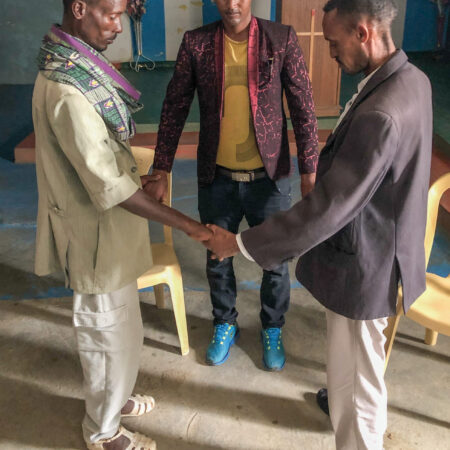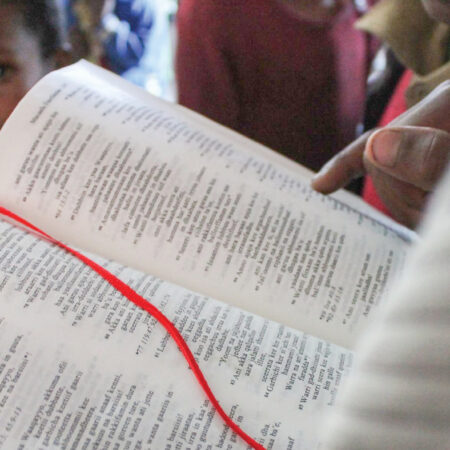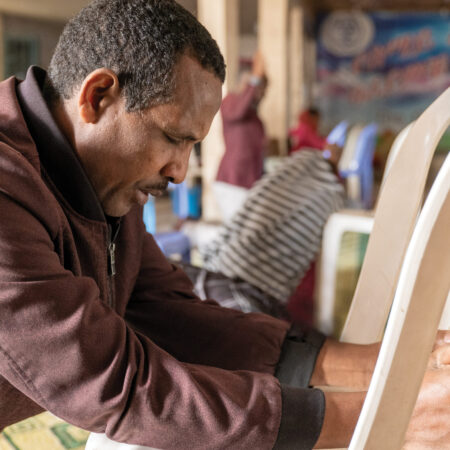Negasi grew up in a traditional church, but he also attended a special school in the northern city of Gondar — once the capital of the ancient Ethiopian Empire, Abyssinia — where he learned how to cast demonic curses and cause people to seemingly lose their minds. He became so proficient at witchcraft that he was honored with a title reserved for the best students.
Finding Their Eternal Home in Prison
Finding Their Eternal Home in Prison

Left to right: Ephrem, Negasi and Dinaw learned that following Christ was much more difficult after they were released from prison
Later, after moving to Axum, a town in the Tigray region that is often regarded as Ethiopia’s spiritual capital, Negasi opened a pharmacy to supplement his income. One day, a customer asked Negasi if he could heal his sister, who was seriously ill and living in Germany.
Negasi told the man that he could cast a spell to heal his sister, but she would have to come to his store so it could be done in person. The man agreed, paying Negasi half the fee for his services and pledging to bring his sister to the pharmacy.
Eight months later, the man returned to the store with his sister, but Negasi had forgotten about their agreement and had never ordered the items needed for the spell. Enraged, the man filed charges against him, and Negasi was promptly arrested.
As a police officer escorted Negasi to jail, they passed a group of young boys playing games with some strange coins. Out of curiosity, Negasi asked the boys if he could have one of the coins. When they obliged, he put their gift in his pocket. Although the coin was of no value to Negasi at the time, it would one day become a treasured keepsake.
After a six-month trial, Negasi was convicted and sentenced to three years and 10 months in prison. He shared a small, cramped prison cell with several other men, and the only place he could find to sleep was next to the toilet.
As he suffered in prison for his crime, Negasi began to think God was punishing him for practicing witchcraft; he feared the consequences of his sins more than he feared death. Too miserable even to eat, he went 20 days without food.
Then, one day he cried out to God with a broken spirit. “I know I am a sinner and I don’t deserve to be in Your home with You in heaven,” he prayed. “But if there is any place outside Your home for me, please allow me to go there.”
Discovering the Truth
Burdened by the weight of his sins, Negasi confessed to an Ethiopian Orthodox priest at the prison, believing that confession to a priest was required for forgiveness.
Seeking some kind of penance for his misdeeds, Negasi devoted himself to the central teachings of the Ethiopian Orthodox Church. He celebrated a different saint each day, just as the church does, and checked out an Ethiopian Orthodox Bible from the prison library. Every time Negasi tried to study the Ethiopian Orthodox Bible, which is in the ancient language of Ge’ez, he fell asleep — even when he wasn’t tired.
Reading the other Bible in his native Tigrinya language, however, captivated him, and he soon noticed passages that contradicted many things he had believed.

Reading the Bible in his native language led Negasi to understand his need for salvation through faith in Christ alone.
Then, one night Negasi had a dream in which he was told that the salvation he was seeking is found in the Gospels. And after a deeper study of the life and teachings of Jesus Christ, he concluded that salvation is found through faith in Christ alone.
Overcome with joy, Negasi began to share this revelation with everyone he could. During times when he was allowed to leave his prison cell, he walked cell to cell telling other prisoners about Christ. He would explain as much as he could before the inmates or guards grew angry and forced him to move on.
“I couldn’t understand why this message was not being taught,” he said. Negasi had no idea the Tigrinya Bible he had been reading was the same one used by many biblical churches in Ethiopia. And he didn’t realize the gospel that had suddenly changed his life was the principal message of biblical churches worldwide.
Causing Trouble
When guards learned that Negasi had been sharing the gospel, they ordered him to stop. And when he refused, they transferred him to a maximum-security cell and placed shackles on his legs.
Eventually, Negasi returned to minimum security, where he met a recent transfer to the cell named Ephrem. Like Negasi, Ephrem had grown up in the traditional church, had learned and practiced witchcraft, and had been questioning what he believed.
In addition, he, too, was imprisoned for taking payment without providing his promised witchcraft services. When Ephrem was transferred to the prison in Axum, his cellmates warned him about Negasi’s teachings.
Persuaded that Negasi’s understanding of the gospel was true, Ephrem eventually placed his faith in Christ. He and Negasi soon became close friends and, together, they continued evangelizing their fellow prisoners.
But when authorities learned that another prisoner had begun sharing the gospel, they decided to take action.

When Negasi, Ephrem and Dinaw learned that there were many other biblical Christians like them, they were excited and emboldened to continue sharing the gospel.
A Growing Brotherhood
Prison guards locked Negasi in solitary confinement for several days with no light. They sent another prisoner, named Dinaw, to check on him occasionally and bring him his daily rations.
Dinaw had grown up in a small village not far from Axum. After getting married and starting a family, he worked as a farm laborer in his village. When he met Negasi, he was serving a three-year prison sentence for assaulting a neighbor following a dispute.
Fellow prisoners had warned Dinaw about the gospel message being shared by Negasi and Ephrem. But as Dinaw brought Negasi his daily meals, he got to know him personally. And after Negasi was released from solitary confinement, Dinaw became good friends with him and Ephrem.
Although Dinaw wanted to follow Jesus according to his new friends’ teachings, he feared the repercussions. “When persecution comes, I will not stand with you,” he told Negasi and Ephrem. “We are all suffering in prison, but you are suffering even more.”
Negasi encouraged Dinaw with passages from John 16 and Romans 8, explaining that trials, tribulations and persecution are part of following Jesus Christ. And after gaining a better understanding of what it means to be His disciple, Dinaw placed his faith in Him.
Dinaw’s father was so angry that he wrote a letter to the police chief, urging him to keep his son behind bars even after he was eligible for release. When guards told Dinaw about his father’s letter, his response surprised them.
“I like prison,” he told the guards. “I can read my Bible every day here, so don’t worry about that.”
After word spread among some local pastors that three prisoners were sharing the true gospel behind bars, they decided to visit the men and offer encouragement. But when the pastors arrived and asked to speak with them, Negasi was confused.
“Who are you?” he asked.
“We are your brothers,” one of the pastors replied.
The pastors explained that everything the men had been teaching other inmates aligned with the central tenets of biblical Christianity. And the three prisoners were excited to hear that many others were sharing the same gospel message.
The pastors visited the men regularly to disciple them and strengthen their friendships. And soon, Negasi, Ephrem and Dinaw were preaching the gospel more boldly than ever throughout the prison. As a result, 15 prisoners came to faith in Christ.

Dinaw was sleeping in a nearby field, tending to one of his cows, when villagers locked his wife and children inside their home and set it ablaze.
Led Through the Fire
After serving their sentences and being released from prison, the three men quickly learned that following Christ in northern Ethiopia is more difficult outside prison than behind bars.
When Negasi’s wife learned of his faithfulness to God’s Word and eagerness to share the gospel, she divorced him and took their daughter with her.
And Dinaw, originally from a small village, struggled to fit in. He didn’t know any other biblical Christians in the part of the city where he settled. So, after a while, he returned to his home village, where he faced continual threats.
About 18 months after Dinaw returned home, the threats turned to violent persecution against his family. One night when he was sleeping in a field near his house to care for one of his cows, a group of villagers came to his home. They tied the door shut from the outside with rope, trapping Dinaw’s wife and children inside as they slept.
Dinaw awoke to the smell of smoke and the sight of his house burning a few hundred yards away. After running home as fast he could, he untied the rope holding the door closed and got his family out just in time. For a while, he and his family stayed in a small, simple structure made of wood and a tarp. In 2019, VOM rebuilt their home.
Despite the challenges, all three men have remained firm in faith. And Dinaw, who once resisted following Christ out of fear of persecution, now accepts it as integral to the Christian faith.
When asked why he has stayed in his village, under continual threat of death, Dinaw explained that he has no fear of death. “My life belongs to God, and I believe He put me here,” he said. “I don’t know why He wants me to stay here, but I believe He is working. If He allows me to be killed, I am ready to die. If He wants to save the entire village, then I have to just be patient. Jesus died in the open on the cross, not underground, so I want to die in the open. That’s the ultimate expression of the gospel.”
When Negasi reflects on the past few years, he, too, sees how God has worked in his life. Upon his release from prison, the guards returned all of his original belongings. And in a pocket of his clothing, he found the coin that the boys had given him on his way to jail.
On one side of the coin was printed “John 3:16” and the words “Those who have the Lord Jesus have eternal life.” On the other side of the coin was the question, “Where is your eternal home?” Negasi still carries the coin with him as a reminder that the Lord allowed him to be put in prison so that he would find his new eternal home.
“I thank God that He put me in prison for a purpose,” he said. Negasi is now a student at a Bible school and hopes to become a full-time pastor. He has paid back all of the money he owed the man who filed charges against him, and they are now good friends. Although the man is not a believer, Negasi hopes that he will become one soon.
“You are my everlasting good person because you put me in prison,” Negasi told the man. “I will not forget you, because you helped me find eternal life.”

